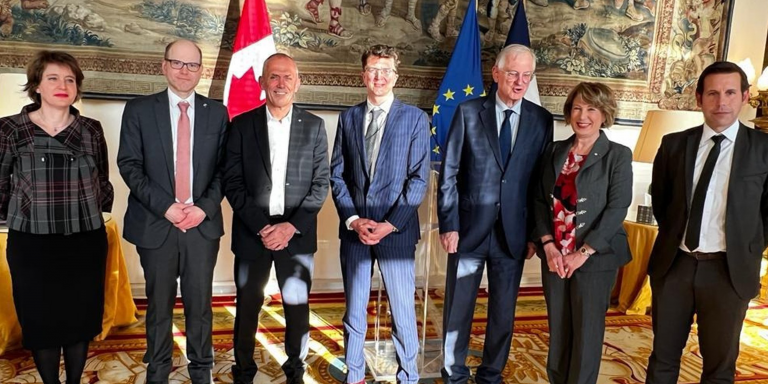
Scientific cooperation between Canada and France is well established, and the CNRS is a stakeholder. On April 25, it announced the creation of two new Franco-Canadian laboratories in addition to the four already established in Canada. These two “International Research Laboratories” are the ” International Laboratory on Learning Systems” in partnership with McGill University, ETS, Mila, Université Paris-Saclay and CentraleSupélec, and the ” Quantum Frontiers Lab”with the Université de Sherbrooke.
At the beginning of the year, CNRS opened its 9th office abroad, in Ottawa, the capital of Canada. Previously, CNRS scientific cooperation in Canada was managed from its North America Office, based in Washington. In January 2019, a joint office between the CNRS and the University of Lyon, hosted by the University of Ottawa, was created with the aim of strengthening and developing Franco-Canadian partnerships in all fields of knowledge. The creation of the Centre allowed CNRS to reaffirm the high level of its commitment to Canada, one of its most important international partners.
The creation of the new CNRS office in Canada aims to expand these efforts, which have been underway for several years, and to build new bridges with universities, research organizations and funding agencies.
When asked about the reasons for the opening of this office, Jean Matas, Director of the CNRS, said:
“This new office should allow CNRS to build a more diversified and targeted partnership approach with research actors. Canada, the4th largest country in terms of co-publications with more than 2,400 scientific articles each year, is a key partner for the CNRS. We share several major scientific strategies, such as artificial intelligence, quantum sciences, and ocean and polar sciences, for which Canada has significant research and innovation strengths in the various provinces and territories. Through partnerships with stakeholders, we also hope to benefit from the complementary approaches of North American research in order to better respond to various social challenges on a global scale. “
CNRS research in Canada involves each of its thematic institutes.
Antoine Petit, CEO of CNRS, emphasizes:
“Thanks to its long history of cooperation, its multidisciplinary roots and its role in coordinating several French national strategies, the CNRS enjoys strong recognition in Canada among government decision-makers, Canadian donors and universities alike. With these two new international laboratories, CNRS is strengthening its presence in Canada, where it created a representative office in early 2022. “
The IRL International Laboratory on Learning Systems (ILLS)
This laboratory brings together the CNRS, McGill University, the Ecole de technologie supérieure (ETS) in Montreal, the Institut québécois d’intelligence artificielle (Mila), the Université Paris-Saclay and CentraleSupélec.
The work to be carried out will involve the development of mathematical tools to improve machine learning algorithms and make their use more secure. These algorithms could be used for natural language and speech processing, computer vision and signal processing applications.
The ILLS will encourage international mobility between the Canadian and French teams to increase the chances of long-term collaborations between researchers, professors, post-doctoral fellows, doctoral students and master students.
The Quantum Frontiers Lab
France and Quebec collaborated for about 40 years on quantum research before the International Research Project “Quantum Circuits and Materials Laboratory “ (LCMQ) was created in 2017 in partnership with the physics department of the University of Sherbrooke, the CNRS National Laboratory for Intense Magnetic Fields (located in Grenoble and Toulouse) and the Solid State Physics Laboratory (CNRS/Université Paris-Saclay).
This IRP is therefore today an IRL whose two research axes are quantum materials, quantum circuits and devices, in the perspective of the scientific resourcing of quantum technologies. Its objective is to conduct cutting-edge international collaborative research, to facilitate the exchange of researchers and students between the University of Sherbrooke and France, and to promote innovative projects between the French and Quebec communities.
Scientists will be able to rely on the complementarity of experimental measurement devices between the Université de Sherbrooke and French laboratories, the sharing of computing resources, the large research infrastructures in France as well as the Quantum Fab Lab of the Institut Quantique de Sherbrooke.
The creation of this IRL alongside the IRL LN2, created in 2012, dedicated to nanotechnologies & nanosystems and also conducted with the Université de Sherbrooke, represents a strategic development for both partners around quantum technologies.
Translated from Le CNRS accroît sa présence au Canada avec la création de deux nouveaux laboratoires









